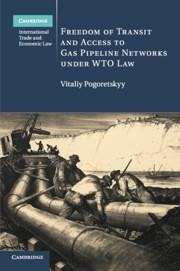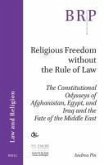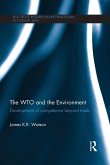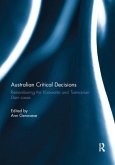Vitaliy Pogoretskyy
Freedom of Transit and Access to Gas Pipeline Networks under WTO Law
Schade – dieser Artikel ist leider ausverkauft. Sobald wir wissen, ob und wann der Artikel wieder verfügbar ist, informieren wir Sie an dieser Stelle.
Vitaliy Pogoretskyy
Freedom of Transit and Access to Gas Pipeline Networks under WTO Law
- Broschiertes Buch
- Merkliste
- Auf die Merkliste
- Bewerten Bewerten
- Teilen
- Produkt teilen
- Produkterinnerung
- Produkterinnerung
A comprehensive and original analysis of all major WTO provisions relating to the transit of pipeline gas.
Andere Kunden interessierten sich auch für
![Brokering Access Brokering Access]() Brokering Access37,99 €
Brokering Access37,99 €![Mexico's Drug War and Criminal Networks Mexico's Drug War and Criminal Networks]() Nilda GarciaMexico's Drug War and Criminal Networks58,99 €
Nilda GarciaMexico's Drug War and Criminal Networks58,99 €![Religious Freedom Without the Rule of Law Religious Freedom Without the Rule of Law]() Andrea PinReligious Freedom Without the Rule of Law81,99 €
Andrea PinReligious Freedom Without the Rule of Law81,99 €![The WTO and the Environment The WTO and the Environment]() James WatsonThe WTO and the Environment53,99 €
James WatsonThe WTO and the Environment53,99 €![The Law of Collaborative Defence Procurement in the European Union The Law of Collaborative Defence Procurement in the European Union]() Baudouin HeuninckxThe Law of Collaborative Defence Procurement in the European Union42,99 €
Baudouin HeuninckxThe Law of Collaborative Defence Procurement in the European Union42,99 €![Migration and Refugee Law Migration and Refugee Law]() John VrachnasMigration and Refugee Law123,99 €
John VrachnasMigration and Refugee Law123,99 €![Australian Critical Decisions Australian Critical Decisions]() Australian Critical Decisions61,99 €
Australian Critical Decisions61,99 €-
-
A comprehensive and original analysis of all major WTO provisions relating to the transit of pipeline gas.
Produktdetails
- Produktdetails
- Verlag: Cambridge University Press
- Seitenzahl: 408
- Erscheinungstermin: 6. Dezember 2018
- Englisch
- Abmessung: 229mm x 152mm x 21mm
- Gewicht: 544g
- ISBN-13: 9781316615249
- ISBN-10: 1316615243
- Artikelnr.: 53776091
- Herstellerkennzeichnung
- Libri GmbH
- Europaallee 1
- 36244 Bad Hersfeld
- gpsr@libri.de
- Verlag: Cambridge University Press
- Seitenzahl: 408
- Erscheinungstermin: 6. Dezember 2018
- Englisch
- Abmessung: 229mm x 152mm x 21mm
- Gewicht: 544g
- ISBN-13: 9781316615249
- ISBN-10: 1316615243
- Artikelnr.: 53776091
- Herstellerkennzeichnung
- Libri GmbH
- Europaallee 1
- 36244 Bad Hersfeld
- gpsr@libri.de
Vitaliy Pogoretskyy works as Counsel at the Advisory Centre on WTO Law, where he assists developing-country Members of the ACWL and the least-developed countries in WTO dispute settlement proceedings, and provides these countries with legal advice and training on WTO law. He has also worked at the Rules Division of the WTO Secretariat, FratiniVergano - European Lawyers, and as a civil servant of the Government of Ukraine.
List of figures
Foreword
Preface, acknowledgements and disclaimer
Tables of cases
List of acronyms and abbreviations
Part I. The Topic and its Importance, the Scope and Structure of this Study, Overview of Relevant Theoretical Issues: 1. Setting the context
2. The scope and structure of this study
3. Overview of relevant theoretical issues
4. Summary and concluding remarks
Part II. Freedom of Transit and Pipeline Gas: Overview of Relevant Legal, Political and Economic Aspects: 1. Introduction
2. Freedom of transit and territorial sovereignty
3. Freedom of transit and pipeline gas
4. Summary and concluding remarks
Part III. General Overview of the International Regulation of Transit: 1. Introduction
2. Transit and its historical contexts - general overview
3. Freedom of transit in different areas of international law
4. Is the principle of freedom of transit a principle of general international law?
5. Summary and concluding remarks
Part IV. Pipeline Gas Transit under WTO Law: Assessment of Third-Party Access and Capacity Establishment Rights: 1. Introduction
2. Applicability of WTO law to gas transit: GATT or GATS?
3. Third-party access and capacity establishment under the GATT
4. Third-party access and capacity establishment under the GATS
5. WTO rules regulating conditions of transit, exceptions and institutional arrangements
6. Summary and concluding remarks
Part V. Third-Party Access and Capacity Establishment Rights in Light of General Principles of International Law: 1. Introduction
2. Relevant principle of general international law
3. Practical questions arising in the context of effective freedom of gas transit
4. Summary and concluding remarks
Part VI. Freedom of Gas Transit in the WTO: Dispute Settlement or Legislative Reform?: 1. Introduction
2. Enforcing third-part access and capacity establishment rights in the WTO dispute settlement: a viable option?
3. How can the regulation of third-party access and capacity establishment rights in the WTO be improved?
4. Summary and concluding remarks
Part VII. General Summary and Conclusions: Appendix 1: selected legal materials
Appendix 2: regulation of transit in selected multilateral treaties
Appendix 3: examples of transit gar pipelines and flows, 2014
Bibliography
Index.
Foreword
Preface, acknowledgements and disclaimer
Tables of cases
List of acronyms and abbreviations
Part I. The Topic and its Importance, the Scope and Structure of this Study, Overview of Relevant Theoretical Issues: 1. Setting the context
2. The scope and structure of this study
3. Overview of relevant theoretical issues
4. Summary and concluding remarks
Part II. Freedom of Transit and Pipeline Gas: Overview of Relevant Legal, Political and Economic Aspects: 1. Introduction
2. Freedom of transit and territorial sovereignty
3. Freedom of transit and pipeline gas
4. Summary and concluding remarks
Part III. General Overview of the International Regulation of Transit: 1. Introduction
2. Transit and its historical contexts - general overview
3. Freedom of transit in different areas of international law
4. Is the principle of freedom of transit a principle of general international law?
5. Summary and concluding remarks
Part IV. Pipeline Gas Transit under WTO Law: Assessment of Third-Party Access and Capacity Establishment Rights: 1. Introduction
2. Applicability of WTO law to gas transit: GATT or GATS?
3. Third-party access and capacity establishment under the GATT
4. Third-party access and capacity establishment under the GATS
5. WTO rules regulating conditions of transit, exceptions and institutional arrangements
6. Summary and concluding remarks
Part V. Third-Party Access and Capacity Establishment Rights in Light of General Principles of International Law: 1. Introduction
2. Relevant principle of general international law
3. Practical questions arising in the context of effective freedom of gas transit
4. Summary and concluding remarks
Part VI. Freedom of Gas Transit in the WTO: Dispute Settlement or Legislative Reform?: 1. Introduction
2. Enforcing third-part access and capacity establishment rights in the WTO dispute settlement: a viable option?
3. How can the regulation of third-party access and capacity establishment rights in the WTO be improved?
4. Summary and concluding remarks
Part VII. General Summary and Conclusions: Appendix 1: selected legal materials
Appendix 2: regulation of transit in selected multilateral treaties
Appendix 3: examples of transit gar pipelines and flows, 2014
Bibliography
Index.
List of figures
Foreword
Preface, acknowledgements and disclaimer
Tables of cases
List of acronyms and abbreviations
Part I. The Topic and its Importance, the Scope and Structure of this Study, Overview of Relevant Theoretical Issues: 1. Setting the context
2. The scope and structure of this study
3. Overview of relevant theoretical issues
4. Summary and concluding remarks
Part II. Freedom of Transit and Pipeline Gas: Overview of Relevant Legal, Political and Economic Aspects: 1. Introduction
2. Freedom of transit and territorial sovereignty
3. Freedom of transit and pipeline gas
4. Summary and concluding remarks
Part III. General Overview of the International Regulation of Transit: 1. Introduction
2. Transit and its historical contexts - general overview
3. Freedom of transit in different areas of international law
4. Is the principle of freedom of transit a principle of general international law?
5. Summary and concluding remarks
Part IV. Pipeline Gas Transit under WTO Law: Assessment of Third-Party Access and Capacity Establishment Rights: 1. Introduction
2. Applicability of WTO law to gas transit: GATT or GATS?
3. Third-party access and capacity establishment under the GATT
4. Third-party access and capacity establishment under the GATS
5. WTO rules regulating conditions of transit, exceptions and institutional arrangements
6. Summary and concluding remarks
Part V. Third-Party Access and Capacity Establishment Rights in Light of General Principles of International Law: 1. Introduction
2. Relevant principle of general international law
3. Practical questions arising in the context of effective freedom of gas transit
4. Summary and concluding remarks
Part VI. Freedom of Gas Transit in the WTO: Dispute Settlement or Legislative Reform?: 1. Introduction
2. Enforcing third-part access and capacity establishment rights in the WTO dispute settlement: a viable option?
3. How can the regulation of third-party access and capacity establishment rights in the WTO be improved?
4. Summary and concluding remarks
Part VII. General Summary and Conclusions: Appendix 1: selected legal materials
Appendix 2: regulation of transit in selected multilateral treaties
Appendix 3: examples of transit gar pipelines and flows, 2014
Bibliography
Index.
Foreword
Preface, acknowledgements and disclaimer
Tables of cases
List of acronyms and abbreviations
Part I. The Topic and its Importance, the Scope and Structure of this Study, Overview of Relevant Theoretical Issues: 1. Setting the context
2. The scope and structure of this study
3. Overview of relevant theoretical issues
4. Summary and concluding remarks
Part II. Freedom of Transit and Pipeline Gas: Overview of Relevant Legal, Political and Economic Aspects: 1. Introduction
2. Freedom of transit and territorial sovereignty
3. Freedom of transit and pipeline gas
4. Summary and concluding remarks
Part III. General Overview of the International Regulation of Transit: 1. Introduction
2. Transit and its historical contexts - general overview
3. Freedom of transit in different areas of international law
4. Is the principle of freedom of transit a principle of general international law?
5. Summary and concluding remarks
Part IV. Pipeline Gas Transit under WTO Law: Assessment of Third-Party Access and Capacity Establishment Rights: 1. Introduction
2. Applicability of WTO law to gas transit: GATT or GATS?
3. Third-party access and capacity establishment under the GATT
4. Third-party access and capacity establishment under the GATS
5. WTO rules regulating conditions of transit, exceptions and institutional arrangements
6. Summary and concluding remarks
Part V. Third-Party Access and Capacity Establishment Rights in Light of General Principles of International Law: 1. Introduction
2. Relevant principle of general international law
3. Practical questions arising in the context of effective freedom of gas transit
4. Summary and concluding remarks
Part VI. Freedom of Gas Transit in the WTO: Dispute Settlement or Legislative Reform?: 1. Introduction
2. Enforcing third-part access and capacity establishment rights in the WTO dispute settlement: a viable option?
3. How can the regulation of third-party access and capacity establishment rights in the WTO be improved?
4. Summary and concluding remarks
Part VII. General Summary and Conclusions: Appendix 1: selected legal materials
Appendix 2: regulation of transit in selected multilateral treaties
Appendix 3: examples of transit gar pipelines and flows, 2014
Bibliography
Index.









